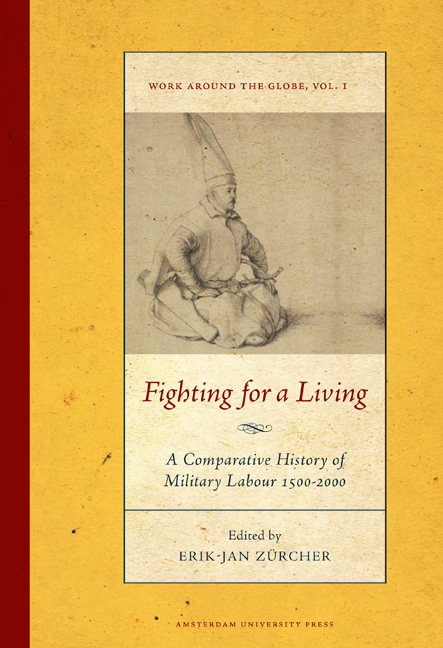Book contents
- Frontmatter
- Dedication
- Contents
- Preface
- Introduction: Understanding Changes in Military Recruitment and Employment Worldwide
- Military Labor in China, c. 1500
- From the Mamluks to the Mansabdars: A Social History of Military Service in South Asia, c. 1500 to c. 1650
- On the Ottoman Janissaries (Fourteenth-nineteenth Centuries)
- Soldiers in Western Europe, c. 1500-17901
- The Scottish Mercenary as a Migrant Labourer in Europe, 1550-1650
- Change and Continuity in Mercenary Armies: Central Europe, 1650-1750
- Peasants Fighting for a Living in Early Modern North India
- “True to Their Salt”: Mechanisms for Recruiting and Managing Military Labour in the Army of the East India Company During the Carnatic Wars in India
- “The Scum of Every County, the Refuse of Mankind”: Recruiting the British Army in the Eighteenth Century
- Mobilization of Warrior Populations in the Ottoman Context, 1750-1850
- Military Employment in Qing Dynasty China
- Military Service and the Russian Social Order, 1649-1861
- The French army, 1789-1914: Volunteers, Pressed Soldiers, and Conscripts
- The Dutch Army in Transition: From All-volunteer Force to Cadre-militia Army, 1795-1830
- The Draft and Draftees in Italy, 1861-1914
- Nation-building, War Experiences, and European Models: The Rejection of Conscription in Britain
- Mobilizing Military Labor in the Age of Total War: Ottoman Conscription Before and During the Great War
- Soldiering as Work: The All-volunteer Force in the United States
- Private Contractors in War From the 1990s to the Present: A Review Essay
- Collective Bibliography
- Notes on Contributors
Nation-building, War Experiences, and European Models: The Rejection of Conscription in Britain
Published online by Cambridge University Press: 12 December 2020
- Frontmatter
- Dedication
- Contents
- Preface
- Introduction: Understanding Changes in Military Recruitment and Employment Worldwide
- Military Labor in China, c. 1500
- From the Mamluks to the Mansabdars: A Social History of Military Service in South Asia, c. 1500 to c. 1650
- On the Ottoman Janissaries (Fourteenth-nineteenth Centuries)
- Soldiers in Western Europe, c. 1500-17901
- The Scottish Mercenary as a Migrant Labourer in Europe, 1550-1650
- Change and Continuity in Mercenary Armies: Central Europe, 1650-1750
- Peasants Fighting for a Living in Early Modern North India
- “True to Their Salt”: Mechanisms for Recruiting and Managing Military Labour in the Army of the East India Company During the Carnatic Wars in India
- “The Scum of Every County, the Refuse of Mankind”: Recruiting the British Army in the Eighteenth Century
- Mobilization of Warrior Populations in the Ottoman Context, 1750-1850
- Military Employment in Qing Dynasty China
- Military Service and the Russian Social Order, 1649-1861
- The French army, 1789-1914: Volunteers, Pressed Soldiers, and Conscripts
- The Dutch Army in Transition: From All-volunteer Force to Cadre-militia Army, 1795-1830
- The Draft and Draftees in Italy, 1861-1914
- Nation-building, War Experiences, and European Models: The Rejection of Conscription in Britain
- Mobilizing Military Labor in the Age of Total War: Ottoman Conscription Before and During the Great War
- Soldiering as Work: The All-volunteer Force in the United States
- Private Contractors in War From the 1990s to the Present: A Review Essay
- Collective Bibliography
- Notes on Contributors
Summary
At the crossroads of state-building, nation-building, and war experiences: the evolution of the model of a nation-in-arms
The evolution of nations and nation-states was linked with experiences of war. The long process of external and internal state-building was a history of warfare and its revolutionary impacts. Most of the numerous territorial states of the early modern period did not survive this violent restructuring of Europe. Between the last third of the eighteenth century and the end of the nineteenth century the number decreased from about 500 states around 1500 to about 20 around 1900. State-building, so much intensified between 1794 and 1815, was directly linked to the experience of wars, and the British war-state of the eighteenth century is a particular illustration of this fundamental aspect of modern history. As a part of this complex process, justifications of war changed, pointing to the new meaning of nation and nation-state as dominant paradigms of political and social legitimacy.
But war not only accompanied the external processes of state-building. It also represented, from the 1750s onwards, a possible means of political emancipation and participation and hence became part of internal nation-building: this is why the modern concept of conscription is such a powerful analytical tool. War changed its character: from being merely dynastic affairs, and cabinet wars, fought with hired mercenaries from different countries who did not identify with an abstract notion of the nation, to wars fought, in theory at least, in the name of the whole nation and by the whole nation-in-arms. On the one hand, and from the last third of the eighteenth century, new forms of “national wars” or “people's wars”, in particular the American War of Independence and then the French revolutionary wars after 1792, meant that more groups of society were now directly affected by war. Warfare based upon mass armies and collective conscription transcended the traditional separation of the civilian population from the direct experience of violent conflict, as had been the aim of traditional cabinet wars since the mid-seventeenth century, fought in the name of monarchical, dynastic, and territorial interests, and avoiding at the same time the horrors of civil war as they had been experienced in the confessional wars of the seventeenth century.
- Type
- Chapter
- Information
- Fighting for a LivingA Comparative Study of Military Labour 1500–2000, pp. 519 - 546Publisher: Amsterdam University PressPrint publication year: 2013



